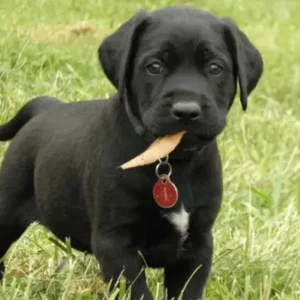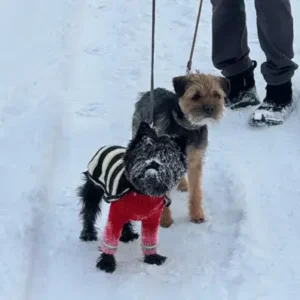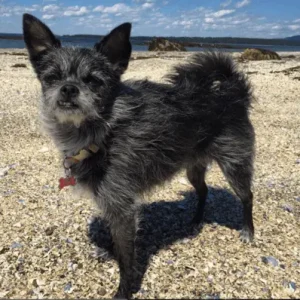Akbash History/Origin
Before delving into the history of the Akbash Dog, it’s essential to understand its origins and significance.
- History
The Akbash Dog, a majestic white livestock guardian purebred, traces its roots to the plains and mountains of western Turkey. While the exact origins of this breed remain somewhat obscure, it stands as an ancient and pure lineage with a unique combination of Tibetan Mastiff and gazehound characteristics. A pivotal moment for the Turkish Akbash dog came in 1980 when the U.S. Department of Agriculture incorporated these magnificent guardians into its Predator Control Program.
Akbash Dog History -Source: Research Gate
These dogs, with their innate protective instincts, demonstrated unparalleled success in safeguarding livestock, solidifying their reputation as reliable protectors.
In 1998, it was recognized by the United Kennel Club in the Guardian dog group.
- Origin of the Akbash Dog
In its native Türkiye, the word akbaş means ‘white head.’ The Akbash Dog holds a vital role in the lives of villagers and shepherds. Bred to protect flocks from wolves and other predators, the Akbash has become an indispensable ally for those relying on their livestock’s safety for their livelihoods.
The journey to recognition as a distinct breed unfolded through the dedicated efforts of Americans David and Judy Nelson. Their extensive fieldwork in Turkey, starting in the 1970s, brought to light the significance of these great white guardians.
The Nelsons, passionate about preserving the breed’s authenticity, imported over 40 Akbash Dogs to the United States. These dogs, serving as the foundation stock, played a pivotal role in establishing the Akbash in both the United States and Canada.
Akbash Personality
If you’ve ever met an Akbash, you know they’re a special breed. These regal dogs are beautiful but also intelligent, loyal, and protective.
Akbash owners love their dogs for these qualities, but they also know that there’s more to their personalities than meets the eye.
Here’s what you need to know about the Akbash personality.
- Guard Instinct
The Akbash is known for its strong guard instinct, making it a vigilant and protective companion. Whether in the home or out in the fields, this breed is quick to sense potential threats, making them reliable guardians.
- Intelligent and Balanced Energy
With a keen intellect and a well-balanced energy level, the Akbash is a thoughtful and composed breed. Their intelligence allows for quick learning, while their balanced energy ensures they are adaptable to various situations, whether it’s playtime with family or focused work in guarding.
- Independent and Gentle Nature
The Akbash exhibits an independent streak, showcasing self-reliance in their actions. Despite their independence, they maintain a gentle nature, fostering a loving and amiable relationship with their families. Unless they view someone as a danger, they are not prone to bark excessively at strangers.
This unique blend of independence and gentleness makes them effective guardians. . It also wonderful companions, which is a common trait seen in many dog breeds.
Akbash Physical Appearance
The Akbash is characterized by a medium to large build, with a tendency towards the larger end of the spectrum. As a predominantly purebred breed, the Akbash shows minimal variations in its physical characteristics.
- Size
Akbash dogs are considered medium-length breeds. They typically weigh between 70 and 140 pounds and stand between 26 and 28 inches tall at the shoulder. However, some Akbash dogs have been known to weigh as much as 180 pounds!
Akbash puppies can weigh around 10 to 15 pounds at birth.
- Coat color
These dogs almost always carry a white coat, hence earning their name ‘White Head.’ Any defined spots of color on their coat render them disqualified, according to the United Kennel Club.
Akbash usually only have some light biscuit or gray shading around their ears paired with a fully white outer coat.
These are often compared to Kangal and while they share the same origin and purpose, there are some differences between these breeds.
Here’s a quick look at Akbash vs. Kangal:
| Characteristic | Akbash | Kangal |
| Origin | Turkey | Turkey |
| Purpose | Livestock Guarding | Livestock Guarding |
| Size | Large | Giant |
| Weight | 90-140 pounds | 110-145 pounds |
| Coat Color | White | Fawn with black mask |
| Coat Type | Double Coat | Short and Dense coat |
| Temperament | Gentle, Protective | Independant, Protective |
| Energy Levels | Low | Moderate |
| Trainability | Intelligent, trainable | Intelligent, independant |
Akbash- source: mokan.akbash
Kangal- source: Pinterest
Akbash Gender Differences
The only major difference between the male and female Akbash lies in their size. While this is a larger dog breed in general, males tend to be even larger and more robust than females.
An average male Akbash stands 30 to 34 inches tall, while a female’s average height hits 28 to 32 inches at the shoulder.
A male features a more muscular build, weighing around 90 to 130 pounds.
Whereas, female Akbash tend to have a lighter frame with an average weight ranging from 80 to 120 pounds.
- Temperament
The Turkish Akbash is celebrated for its innate protective and guarding instincts, however, this temperament varies between males and females.
Males excel as guard dogs, showcasing a robust sense of guarding and a more assertive protective instinct. Their temperament leans towards the assertively protective, making them an ideal choice for roles that demand a strong and vigilant guardian presence.
Whereas, a female Akbash comes off as more nurturing and caring. With early training and proper socialization, they are more likely to develop a strong sense of caring for other animals than males.
Akbash Feed/Nutrition
These dogs are a large breed that need good amounts of nutrient-packed foods. However, their energy levels are generally low; therefore, overfeeding can quickly lead to obesity.
It’s important to keep the age, size, and activity levels of your Akbash in mind before deciding upon their diet. Like all breeds, these dogs need food high in protein and good sources of fats, vitamins, and minerals.
Akbash also love treats, just like other dogs. However, due to their low energy levels, it’s crucial to not overdo treats to avoid obesity. Healthy treats like bananas and strawberries can be a great option in moderation.
Akbash Health Problems
Akbash dogs are generally robust and healthy, yet, like any breed, they may be susceptible to specific health conditions. Regular veterinary check-ups and proactive preventive care are essential for maintaining their well-being.
- Hip Dysplasia: Hip dysplasia is a common orthopedic condition where the hip joint doesn’t fit into the hip socket properly. This can lead to discomfort, pain, and impaired mobility. Regular exercise, a balanced diet, and maintaining a healthy weight can help manage this condition.
- Hyperthyroidism: Hyperthyroidism occurs when the thyroid gland produces an excess of thyroid hormones. Symptoms may include weight loss, increased appetite, and restlessness. Treatment often involves medication to regulate hormone levels and manage symptoms effectively.
- Gastric Torsion: Bloat, or gastric torsion, is a serious condition where the stomach fills with gas and twists on itself. This can be life-threatening and requires immediate veterinary attention. Symptoms include a distended abdomen, restlessness, and unsuccessful attempts to vomit. Feeding smaller, more frequent meals and avoiding strenuous exercise after meals can help reduce the risk of bloat.
Akbash Care and Grooming
Akbash features a double coat, with a finer and smaller undercoat and coarse and long hair on the outer guard.
They usually shed annually so grooming this breed is not generally considered very hard and time taking. Weekly brushing or brushing twice a week is adequate.
Like all breeds, it requires occasional cleaning of ears and trimming of nails. You should only bathe your Akbash when needed, using a shampoo or soap that is verified as safe by a professional.
For dog training tips, it’s important to establish consistency early on and provide positive reinforcement. Akbash dogs are independent but respond well to patient, firm training methods.
Akbash Price
The average price for an Akbash varies on multiple factors and usually ranges from $800 to $2000. Here are some sites you can get an Akbash puppy:
Buy or Adopt Akbash
If you’re looking to get an Akbash, you can adopt one from a rescue group to provide it with a loving home:
Interesting Facts
- The Akbash gained official recognition by the United Kennel Club on January 1, 1998, affirming its status as a distinctive and noteworthy breed.
- It gets its name from the Turkish word Akbaş, which literally means “White Head”.
- They were enlisted in the U.S. Department of Agriculture’s Predator Control Program, showcasing their prowess in protecting livestock.
Best For
The Akbash excels in roles such as guarding livestock and utilizing its strong protective instincts to ensure the safety of herds. Additionally, this breed serves as an exceptional family protector, combining its vigilant nature with a gentle disposition, making it a loyal and reliable guardian for loved ones.
Akbash Top Names
| Male Akbash Names | Female Akbash Names |
| Orion | Bella |
| Thor | Willow |
| Maximus | Cleo |
| Ranger | Daisy |
| Duke | Athena |
| Apollo | Luna |
| Jasper | Nova |
| Titan | Misty |
| Rocky | Sasha |
| Rex | Rosie |

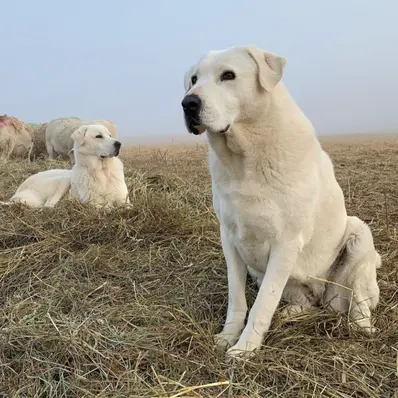







 Akbash Dog History -Source:
Akbash Dog History -Source: 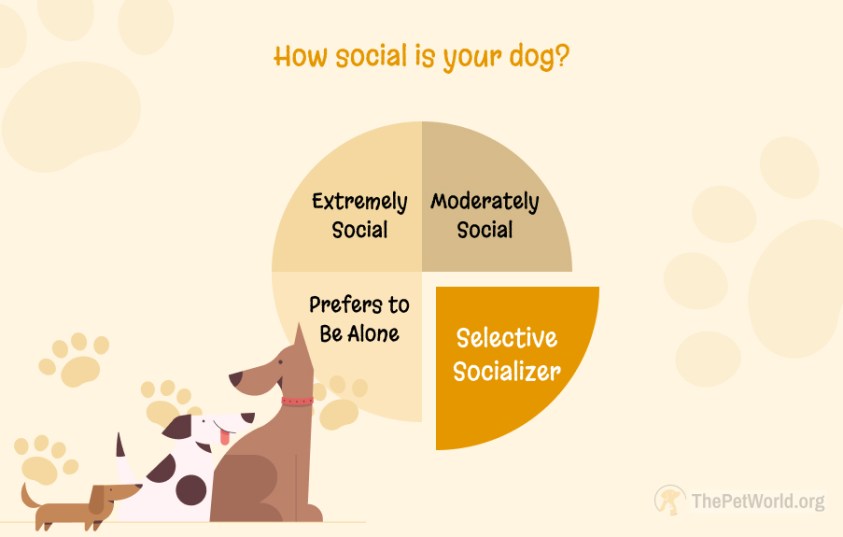

 Akbash- source:
Akbash- source:  Kangal- source:
Kangal- source: 


